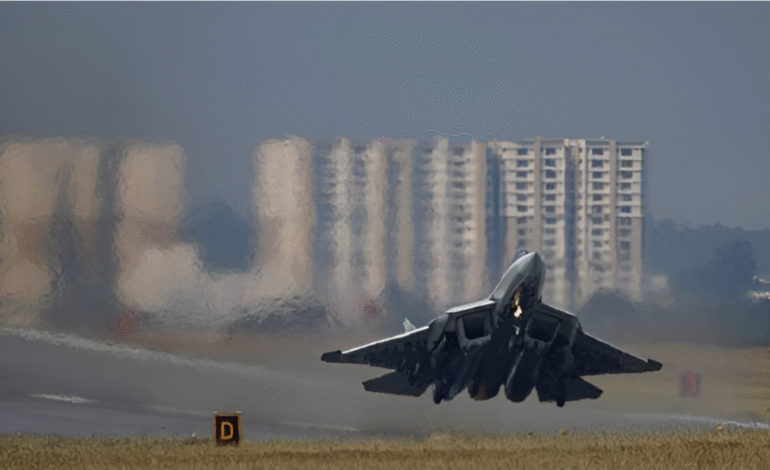India Clarifies Jet Loss Claims After Jakarta Attaché Remarks

India’s diplomatic mission in Jakarta recently issued a strong clarification following widespread media reports that claimed the Indian Air Force (IAF) had suffered substantial aircraft losses during a past conflict with Pakistan. These reports were based on remarks made by Captain Shiv Kumar, the Indian Defence Attaché to Indonesia, during a June 10 seminar. The embassy stated that his words were quoted out of context and the resulting news stories misrepresented the intent of his presentation.
According to the official statement shared on social media platform X, Captain Shiv Kumar had participated in an academic seminar at Universitas Dirgantara Marsekal Suryadarma in Indonesia. His presentation aimed to shed light on India’s military doctrine, particularly the concept of civilian supremacy over the armed forces. The embassy emphasized that the attaché’s message was meant to underline how the Indian Armed Forces operate under civilian political control, distinguishing India from some neighboring countries.
Seminar Address Focused on Strategy and Civilian Oversight
Captain Shiv Kumar’s 35-minute presentation addressed the broader topic of the India–Pakistan air conflict and Indonesia’s approach to defense strategy. During the talk, he touched upon the Indian Air Force’s operations and referenced the highly publicized Operation Sindoor. While acknowledging that India had experienced some losses during aerial operations, he did not confirm the exaggerated figures reported by certain sections of the media.
He clarified his position by stating that while he might not agree with the claim that several jets were lost, he did agree that India lost a few aircraft. This statement, although brief and qualified, was immediately picked up by media outlets and repurposed into headlines suggesting that India had finally admitted to a massive aerial defeat at the hands of Pakistan.
In his seminar, Captain Kumar explained that the Indian Armed Forces, particularly the Air Force, are guided by principles of civilian accountability. The losses occurred during a time when political leadership had placed clear restrictions on escalation, including refraining from targeting Pakistan’s military infrastructure and air defense systems during the early stages of the operation.
Operation Sindoor and the Tactical Evolution
Operation Sindoor, launched in early May, was India’s largest air operation since the 1971 war. Its primary goal was to eliminate terrorist infrastructure located in Pakistan and Pakistan-occupied Kashmir (PoK). The operation initially focused on achieving its objectives without provoking a larger military conflict. According to the embassy’s clarification, this non-escalatory stance was intentional and guided by political considerations rather than military limitations.
The operation reportedly involved strikes against nine terrorist-linked sites. These initial attacks were carried out under strict rules of engagement to avoid hitting military targets. As a result, Indian pilots were not permitted to neutralize Pakistan’s air defense systems during the first wave of strikes. This strategic restraint is believed to have contributed to some of the losses India experienced during the mission.
Following these setbacks, India revised its strategy. In his seminar remarks, Captain Kumar mentioned that the Indian Air Force moved quickly to alter its tactical approach. They began focusing on suppressing enemy air defenses before launching further attacks. This shift was key to ensuring the success of subsequent operations, which made use of precision-guided BrahMos cruise missiles to target Pakistani military infrastructure. These strikes were carried out on May 10, just a few days after the initial wave of Operation Sindoor.
Comments by CDS General Anil Chauhan Provide Further Insight
Chief of Defence Staff (CDS) General Anil Chauhan also addressed the issue in a separate international forum earlier in June. Speaking at a defense conference in Singapore, General Chauhan commented that the focus should not be on how many jets India lost, but rather why the losses occurred. He pointed out that once India adapted its tactics to deal with Pakistani air defenses, the subsequent missions were executed without any further losses.
General Chauhan categorically rejected Pakistan’s claim of shooting down six Indian jets, describing it as “absolutely incorrect.” His comments echoed Captain Kumar’s sentiment, reinforcing the position that India’s military actions were well-planned and effective despite the early challenges.
According to General Chauhan, after the early losses, India implemented a new set of tactics that prioritized the suppression of enemy air defenses. This allowed the Indian Air Force to conduct operations more effectively and safely. It also highlighted the professionalism of the Indian military, which was able to adapt quickly and decisively in response to battlefield realities.
Media Misinterpretation and Embassy Rebuttal
The Indian Embassy in Jakarta was quick to respond after the media coverage of Captain Shiv Kumar’s remarks generated public and political backlash. The embassy released a statement on June 29 clarifying that the attaché’s remarks had been distorted and reiterated that the seminar presentation was focused on showcasing India’s commitment to democratic values, including the principle that its military operates under the authority of elected civilian leaders.
They also explained that the remarks concerning losses during Operation Sindoor were not the central theme of the talk. Instead, those comments were intended to illustrate how the Indian military’s operations are shaped by political directives. This included decisions aimed at avoiding escalation with Pakistan while still pursuing security objectives through precise and calculated action.
Political Reactions in India and Rising Demands for Clarity
The controversy sparked immediate reactions from India’s political opposition, particularly the Indian National Congress party. Senior party leaders accused the government of withholding key information about Operation Sindoor and misleading the public. Congress general secretary Jairam Ramesh questioned why the Prime Minister had not called an all-party meeting to discuss the matter in light of the defence attaché’s comments.
Congress spokesperson Pawan Khera alleged that the government had misled the country from the outset by making only vague references to Indian losses. He stated that the recent acknowledgments by Captain Kumar and General Chauhan contradicted earlier narratives and highlighted the need for transparency.
Party president Mallikarjun Kharge went further by demanding a special session of Parliament to address the issue and provide a full account of the operation and its outcomes. The opposition contended that while the Indian Air Force had hinted at losses, the absence of detailed disclosures created confusion and speculation.
Pakistan’s Claims and India’s Strategic Response
Pakistan has claimed that during the intense dogfight that followed India’s strikes, it downed six Indian aircraft, including modern Rafale and MiG-29 jets. Pakistani authorities also said they captured evidence of the downed aircraft and that their air force had mobilized over 100 jets in response to Indian actions.
India, however, has consistently disputed these numbers. While acknowledging the loss of a few aircraft, the Indian Air Force and defence officials maintain that the operation achieved its objectives and that Pakistani claims are exaggerated. India’s strategic restraint during the initial stages of Operation Sindoor has been emphasized as a reflection of its responsible approach to cross-border conflict.
Lessons in Communication and Strategy
The events surrounding Operation Sindoor and the recent controversy over Captain Shiv Kumar’s remarks offer several key takeaways. First, they underscore the importance of clear and consistent communication, especially when military matters are discussed in public or academic forums. Remarks made in good faith can easily be misrepresented if taken out of context, leading to misinformation and unnecessary political disputes.
Second, the episode highlights the delicate balance between military decision-making and political oversight in democratic countries. India’s approach during the air operation demonstrates how strategic restraint can be used effectively when guided by clearly defined political objectives.
Finally, the incident reveals how important it is for governments and military officials to engage transparently with both the public and the press. In an era of fast-moving news cycles and viral misinformation, clarity and context are essential for maintaining credibility and trust—both domestically and internationally.








3 Comments
[…] India is upgrading its long-range Agni-5 missile into a highly powerful bunker-busting weapon, capable of destroying underground military targets. This ne […]
[…] a potentially game-changing development, Chinese Foreign Minister Wang Yi is expected to visit India later this month for the 24th round of the Special Representatives (SR) talks. This diplomatic move […]
[…] the company’s Indian entity, to operate its Generation 1 (Gen1) satellite constellation in India. This marks a major milestone for Starlink’s entry into one of the world’s largest internet […]
Comments are closed.